Half a day 大学英语精读1 第一课笔记
- 格式:doc
- 大小:32.00 KB
- 文档页数:3
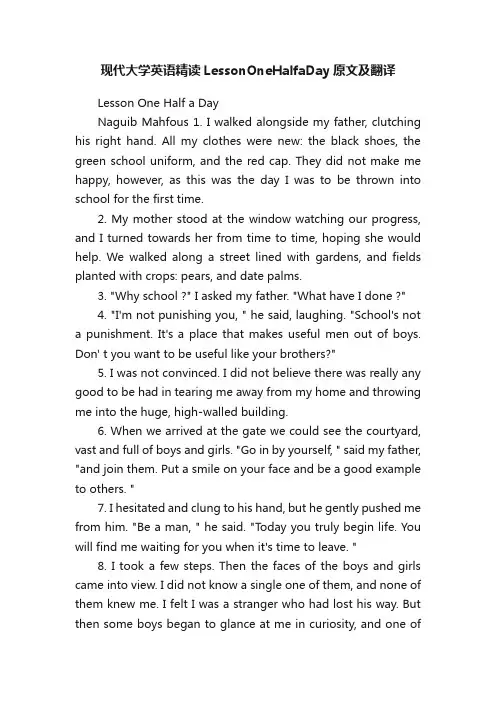
现代大学英语精读LessonOneHalfaDay原文及翻译Lesson One Half a DayNaguib Mahfous 1. I walked alongside my father, clutching his right hand. All my clothes were new: the black shoes, the green school uniform, and the red cap. They did not make me happy, however, as this was the day I was to be thrown into school for the first time.2. My mother stood at the window watching our progress, and I turned towards her from time to time, hoping she would help. We walked along a street lined with gardens, and fields planted with crops: pears, and date palms.3. "Why school ?" I asked my father. "What have I done ?"4. "I'm not punishing you, " he said, laughing. "School's nota punishment. It's a place that makes useful men out of boys. Don' t you want to be useful like your brothers?"5. I was not convinced. I did not believe there was really any good to be had in tearing me away from my home and throwing me into the huge, high-walled building.6. When we arrived at the gate we could see the courtyard, vast and full of boys and girls. "Go in by yourself, " said my father, "and join them. Put a smile on your face and be a good example to others. "7. I hesitated and clung to his hand, but he gently pushed me from him. "Be a man, " he said. "T oday you truly begin life. You will find me waiting for you when it's time to leave. "8. I took a few steps. Then the faces of the boys and girls came into view. I did not know a single one of them, and none of them knew me. I felt I was a stranger who had lost his way. But then some boys began to glance at me in curiosity, and one ofthem came over and asked, "Who brought you?"9. "My father, " I whispered.10. "My father's dead, " he said simply.11. I did not know what to say. The gate was now closed. Some of the children burst into tears. The bell rang. A lady came along, followed by a group of men. The men began sorting us into ranks. We were formed into an intricate pattern in the great courtyard surrounded by high buildings; from each floor we were overlooked by a long balcony roofed in wood.12. "This is your new home, "said the woman. "There are mothers and fathers here, too. Everything that is enjoyable and beneficial is here. So dry your tears and face life joyfully. "13. Well, it seemed that my misgivings had had no basis. From thefirst moments I made many friends and fell in love with many girls. I had never imagined school would have this rich variety of experiences.14. We played all sorts of games. In the music room we sang our first songs. We also had our first introduction to language. We saw a globe of the Earth, which revolved and showed the various continents and countries. We started learning numbers, and we were told the story of the Creator of the universe. We ate delicious food, took a little nap, and woke up to go on with friendship and love, playing and learning.15. Our path, however, was not totally sweet and unclouded. We had to be observant and patient. It was not all a matter of playing and fooling around. Rivalries could bring about pain and hatred or give rise to fighting. And while the lady would sometimes smile, she would often yell and scold. Even more frequently she would resort to physical punishment.16. In addition, the time for changing one' s mind was over and gone and there was no question of ever returning to the paradise of home. Nothing lay ahead of us but exertion, struggle, and perseverance. Those who were able took advantage of the opportunities for success and happiness that presented themselves.17. The bell rang, announcing the passing of the day and the end of work. The children rushed toward the gate, which was opened again. I said goodbye to friends and sweethearts and passed through the gate. Ilooked around but found no trace of my father, who had promised to be there. I stepped aside to wait. When I had waited for a long time in vain, I decided to return home on my own. I walked a few steps, then came to a startled halt. Good Lord! Where was the street lined with gardens? Where had it disappeared to? When did all these cars invade it? And when did all these people come to rest on its surface? How did these hills of rubbish find their way to cover its sides? And where were the fields that bordered it? High buildings had taken over, the street was full of children, and disturbing noises shook the air. Here and there stood conjurers showing off their tricks or making snakes appear from baskets. Then there was a band announcing the opening of a circus, with clowns and weight lifters walking in front.18. Good God! I was in a daze. My head spun. I almost went crazy. How could all this have happened in half a day, between early morning and sunset? I would find the answer at home with my father. But where was my home? I hurried towards the crossroads, because I remembered that I had to cross the street to reach our house, but the stream of cars would not let up.Extremely irritated, I wondered when I would be able to cross.19. I stood there a long time, until the young boy employed at the ironing shop on the corner came up to me.20. He stretched out his arm and said, "Grandpa, let me take you across."第一课半日1 我走在父亲的一侧,牢牢地抓着他的右手。
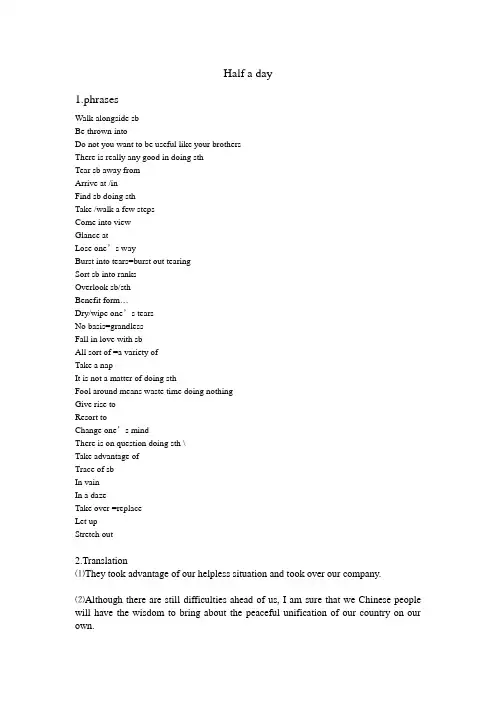
Half a day1.phrasesWalk alongside sbBe thrown intoDo not you want to be useful like your brothersThere is really any good in doing sthTear sb away fromArrive at /inFind sb doing sthTake /walk a few stepsCome into viewGlance atLose one’s wayBurst into tears=burst out tearingSort sb into ranksOverlook sb/sthBenefit form…Dry/wipe one’s tearsNo basis=grandlessFall in love with sbAll sort of =a variety ofTake a napIt is not a matter of doing sthFool around means waste time doing nothingGive rise toResort toChange one’s mindThere is on question doing sth \Take advantage ofTrace of sbIn vainIn a dazeTake over =replaceLet upStretch out2.Translation⑴They took advantage of our helpless situation and took over our company.⑵Although there are still difficulties ahead of us, I am sure that we Chinese people will have the wisdom to bring about the peaceful unification of our country on our own.⑶It is wrong to put emphasis on nothing but GDP. It will give rise to many serious problems.⑷He loves to show off his wealth, but that is all in vain. People also avoid him as though he were poison.⑸He soon fell in love with this village, and was determined to make it a beautiful garden together with other villagers.⑹We must spend more money fighting against global worming. In addition, we must resort to tough laws. It is not just a matter of money .⑺When the police arrived at school ,the students and teachers were still in a daze.⑻This corrupt official was still clinging to his power. He refused to step aside.⑼When the man finally came in to view, I found it was my father. I did not know how he managed to find this place in the blinding snow. At that moment , I burst into tears.⑽She glanced at him from time to time. It was the first time in her life that she had found herself looking at a young man like that.⑴Before I came into collage, I had never thought that that life in collage would be so rich and interesting.⑵Most of the Chinese collage students born in 1990s are the only child of their families.⑶All those who know him admire him for his work .⑷I missed this class because I did not know it had moved up to Thursday.⑸In some counties, those who are overweight will be punished one way or another.⑹Soon after the fire,those who were lost their homes were taken to a safe place .⑺When we met again, we found that we both had changed a lot.⑻A team of experts headed by Professor Li will soon come and help famers solve their problems.⑼The field planted with tomatoes used to be wasteland.⑽Our teacher told us to read books written by such master as Mar Dun and Ba Jin.。

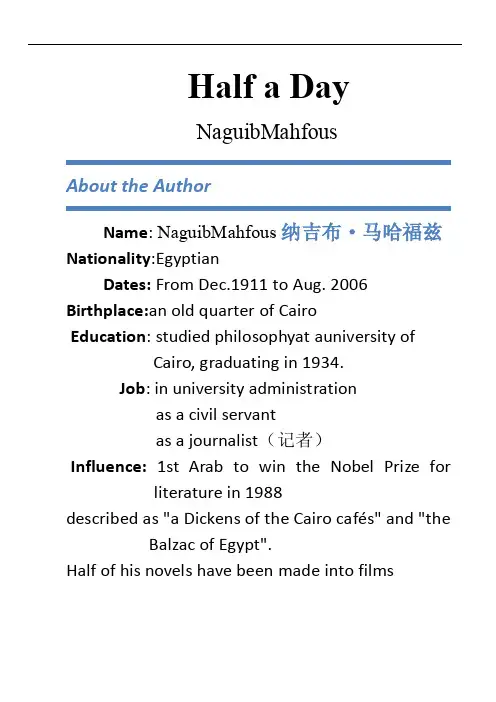
Half a DayNaguibMahfousAbout the AuthorName: NaguibMahfous纳吉布·马哈福兹Nationality:EgyptianDates: From Dec.1911 to Aug. 2006 Birthplace:an old quarter of CairoEducation: studied philosophyat auniversity ofCairo, graduating in 1934.Job: in university administrationas a civil servantas a journalist(记者)Influence: 1st Arab to win the Nobel Prize for literature in 1988described as "a Dickens of the Cairo cafés" and "the Balzac of Egypt".Half of his novels have been made into filmsAbout the AuthorWorks: no fewer than 30 novels, more than 100 short stories, and more than 200 articles●the Cairo Trilogy in 1957●Children of Gebelawi in 1959 (Prize novel for the reasonthat "who, through works rich in nuance - nowclear-sightedly realistic, now evocatively ambiguous -has formed an Arabian narrative art that applies to allmankind"(他通过大量刻画入微的作品—洞察一切的现实主义,唤起人们树立雄心—形成了全人类所欣赏的阿拉伯语言艺术)●the Thief and the Dogs in 1961《小偷与狗》●Small Talk on the Nile in 1966《尼罗河上的絮语》About the Half a Day●First published in Arabic in 1989as part of a short story collectionentitled The False Dawn.●Included in an English-language collection entitled The Time andthe Place in 1991.●Belongs to his later phase and characterized by a shift from socialrealism to a more modern, experimental mode of writing.●An allegorical taleimplicates a commentary on the humancondition; an entire life span is experienced as only ''half a day'' in the school of life and also alludes to the cycle of life, whereby the narrator passes through childhood, middle age and old age in the course of one day.●Uses a strategy commonly used in fiction writing –theprotagonist returns after being absent for a short time to find everything changed beyond recognition. The best example is Rip Van Winkle, a short story by American writer, Washington Irving.●This technique is often used to emphasize rapid changes insociety.Structure●Plot故事情节: a little boy’s first time to go to school●Setting背景: on the way to schoolat schoolon the way home●Protagonist/Narrator主人公/讲述人: “I”–the boy in thestory●Theme of the story主题: rapid changes in societyThree Parts●Para. 1-7: t he boy’s reluctance to go to schoolHis misgivings about school●Para. 8-16: t he Boy’s life at school:Rich and colorful, Requiringdiscipline and hard workPara. 17-20: at the end of school day:Everything has changed!●Detailed Analysis—para1S1---I walked alongside my father, clutching his right hand.1. What’s the function of the –ing form clutchinghis right hand?2. Who clutched his right hand?3. Can you find some other –ing form in this passage whose function is the same as clutching his right hand?S2---All my clothes were new:the black shoes, the green school uniform, and the red cap.S3---They did not make me happy, however, as this was the day I was to be thrown into school for the first time.1. What does They refer to?2. What is the function of the clause I was to bethrown into school for the first time?3. Can you identify the sentence type?Simple sentence, Compound sentenceComplex sentence orCompound-complex sentence4. What’s the p art of speech of however?the minute/moment (that)... as soon as... 一...就...: I want to see him the minute (that) he arrives. 他一来到我就要见他.Detailed Analysis—para2S1---My mother stood at the window watching our progress, and I turned towards her from time to time, hoping she would help.1. Can you identify the sentence type?2. Can you find the logical subject of the present participle phrases watching our progress and hoping she would help?3. What do you get from the phrase hoping she would help?4. What does watching our progress mean?Detailed Analysis—para2S2---We walked along a street lined with gardens and fields planted with crops, pears, and date palms.1. What’s the function of lined with gardens and planted with crops?2. Can you put in the omitted parts of lined with gardens and planted with crops?3. Can you find some more in this passage?Descriptive PhrasesCompare:1.People who are unhappy with the amount of spam they receiveshould write to their lawmakers.2.People unhappy with the amount of spam they receive should writeto their lawmakers.3.Pierre Omidyar, who is the founder of eBay, is one of the richest menin the world.4.Pierre Omidyar, the founder of eBay, is one of the richest men in theworld.5.One-half of all of the e-mail that is sent today is spam.6.One-half of all of the e-mail sent today is spam.7.There are about 11 million items that are listed on eBay.8.There are about 11 million items listed on eBay.9.A man who is living in Florida retired at the age of 37 after makingmillions in the spam business.10.A man living in Florida retired at the age of 37 after making millions inthe spam business.Detailed Analysis—para2S2---We walked along a street lined with gardens, and fields planted with crops: pears, and date palms.Descriptive PhrasesCompare:11.Shoppers who are using eBay can locate a hard-to-find item.12.Shoppers using eBay can locate a hard-to-find item.13.Spam, which is unwanted commercial e-mail, is an annoyingproblem.14.Spam, unwanted commercial e-mail, is an annoying problem.15.eBay, which is an auction Web site, is very popular.16.eBay, an auction Web site, is very popular.17.A man who is in Florida retired at the age of 37.18.A man in Florida retired at the age of 37.19.Pierre, who is from France, created eBay.20.Pierre, from France, created eBay.Detailed Analysis—para2S2---We walked along a street lined with gardens, and fields planted with crops: pears, and date palms.3. From above, can you summarize the similarities of all these sentences?Descriptive PhrasesLanguage Note:1. A descriptive phrase can be essential or nonessential. A nonessentialphrase is set off by commas.People unhappy with the amount of spam they receive should writeto their lawmakers.Pierre Omidyar, the founder of eBay, is one of the richest men in theworld.2.An appositive is always nonessential., an online store, is a very popular Web site.Detailed Analysis—para3S1---"Why school?" I asked my father. "What have I done?”1. What’s the feeling of the boy?2. What’s the elliptical sentence?3. What is the rhetorical question?Summary—para1-3What do you get from these paragraphs?The boy’s feelingHelpless—new clothes did not make me happy Thrown into schoolFrom time to timeHoping she would helpWhy school? What have I done?Detailed Analysis—para4S3---It's a place that makes useful men out of boys.1. make…(out) of sb/sth: cause sb/sth to be orbecome sth使某人[某事物]处於某状况或变成某事物:使其成为争论之点.Eg.W e'll make a footballer of him yet.我们还是要把他造就成优秀的足球运动员Don't make a habit of it/Don't make it a habit.不要养成那样的习惯.2. What is the function of that makes useful menout of boys? Can you find some more in this passage?3. Can you identify the sentence type?Detailed Analysis—para5S2---I did not believe there was really any good to be had in tearing me away from my home and throwing me into the huge, high-walled building.1. It is no good/use doing sth. Or There is no good to be had in doing sth.: It is not useful to do 做…没有什么用处eg. It’s no good crying over spilt milk. 覆水难收It’s no use talking to him2. tearoneself/sb. away from ...:leave sb/sthreluctantly 勉强使离开,忍痛舍去Eg.Do tear yourself away from the television and come out for a walk. 你别舍不得离开电视了, 出去散散步吧.The young artist couldn't tear himself awayfrom da Vinci's Mona Lisa.He couldn’t tear himself away from the book.3. Can you identify the sentence type?Detailed Analysis—para6S1---When we arrived at the gate we could see the courtyard, vast and full of boys and girls.1. What’s the function of the adjective phrase vastand full of boys and girls?2. Can you put in the omitted parts of this phrase?3. Can you identify the sentence type?Detailed Analysis—para7S1---I hesitated and clung to his hand, but he gently pushed me from him.1. Can you identify the sentence type?2. What’s the base/original form of clung?Fling: 扔, 抛, 掷Sting: 蜇(伤), 刺(伤)(某人)String: 装弦, 用线或细绳将…穿起来Swing: 摆动, 摇摆S2---“Be a man,” he said.1. What does man mean here?S3---Y ou will find me waiting for you when it's time to leave. "1. What’s the function of waiting for you?2. Can you tell the difference between object complement andpresent participle as adverbial?Can you tell the difference between object complement and direct object?3. Can you identify the sentence type?4. Complete the Ex6 on page 14.Detailed Analysis—para8I took a few steps. Then the faces of the boys and girls came into view. I did not know a single one of them, and none of them knew me. I felt I was a stranger who had lost his way. But then some boys began to glance at me in curiosity,and one of them came over and asked, "Who brought you?"Detailed Analysis—para11S1---I did not know what to say.1. question word + to do sthS2---The gate was now closed.1. What’s the function of closed? Is it a past participle as adjective or a past participle to form a passive voice?Detailed Analysis—para11S3---Some of the children burst into tears.burst into: send out or produce sth suddenly and violently 突然而猛烈地发出或产生出某事物eg. The aircraft crashed and burst into flames. 飞机坠毁起火.burst into tears, song, angry speech突然哭﹑唱﹑吵起来trees bursting into leaf/ bloom/ blossom/flower 长出新叶[开花]的树木burst out●speak suddenly and with feeling; exclaim突然激动地说; 叫嚷:Eg.`I hate you!' she burst out.‘我讨厌你!’ 她叫嚷道.●(with the -ing form 与-ing连用) suddenly begin (doing sth) 突然开始(做某事):Eg.burst out crying/laughing/singing突然哭起来[笑起来/唱起来].Detailed Analysis—para11S5---A lady came along, followed by a group of men.1. What’s the function of followed by a group of men?S6---The men began sorting us into ranks.1. sort: ~ sth (out) (into sth); ~ sth (out) from stharrange things in groups; separate things of one type, class, etc from things ofother types, etc 将事物分类; 整理:Eg. He was sorting his foreign stamps into piles. 他正在整理外国邮票, 都分成一摞一摞的.We must sort out the good apples from the bad. 咱们得把好苹果拣出来, 同坏的分开.2. Can you list some verbs which should be followed by doing sth or by to do sth or both?The following verbs take a gerund.admit advise* allow* appreciate avoid consider delaydeny discuss dislike enjoy escape excuse finish forbid*imagine include keep (on) mind miss permit*postpone practice quitrecommendresentresist risk stand stop suggest*Allow doing sth allow sb to do sthDetailed Analysis—para11S7---We were formed into an intricate pattern in the great courtyard surrounded by high buildings;from each floor we wereoverlooked by a long balcony roofed in wood.1. Can you identify the sentence type? Why?2. What’s the function of the past participle phrases surrounded by high buildings and roofed in wood?Detailed Analysis—para13S1---Well, it seemed that my misgivings had had no basis.1. What’s the function of the clause that my misgivings had had no basis?2. Why the author use the two different tenses?3. What does the author convey to the reader?S2---From the first moments I made many friends and fell in love with many girls.1. What does the author convey to the reader?S3---I had never imagined school would have this rich variety of experiences.1.How can you explain the two different tenses?2.What are the experiences?Detailed Analysis—para14S2---In the music room we sang our first songs. 1. What’s the base/original form of sang?Bgin, drink, ring, swim, spring*shrink收缩; 萎缩shrank, shrunk/shrunken (定语) *sink下沉sank, sunk/sunken(定语)*spin旋转spun/span(古语), spunS4---We saw a globe of the Earth, which revolved and showed the various continents andcountries.1. What’s the function of the clause which revolvedand showed the various continents andcountries?S5---We started learning numbers, and we were told the story of the Creator of the universe.1. What does the Creator means?2. Can you identify the sentence type? Why?Detailed Analysis—para14S6---We ate delicious food, took a little nap, and woke up to go on with friendship and love, playing and learning.1. Can you identify the sentence type? Why?2. What’s the function of the phrase playing and learning?3. What’s the function of the infinitive phrase to go on with friendship and love?4. What’s the difference between the result infinitive and purpose infinitive?Detailed Analysis—para15S1---Our path, however, was not totally sweet and unclouded.1. What’s part of speech of however?S2---We had to be observant and patient.1.observant●quick at noticing things 善於观察的; 机警的; 注意的:eg. An observant shop assistant had remembered exactly what the man was wearing. 有个机警的店员准确记得那个男子的穿着.Journalists are trained to be observant. 新闻记者都要训练成有敏锐观察力的人.●(fml文) careful to obey laws, customs, traditions, etc(对法律﹑习俗﹑传统等)谨慎遵守的: Eg. observant of the rules 遵守规则.Detailed Analysis—para15S3---It was not all a matter of playing and fooling around.1. a matter of: situation, question or issue that depends on sth else 取决於某事的情况﹑问题或事情:Eg. Dealing with these problems is all a matter of experience.处理这些问题全凭经验.Success in business is simply a matter of knowing when totake a chance. 商业上的成功就在於把握时机.2. fool around/about:●behave stupidly or foolishly 干蠢事:eg. Stop fooling about with that knife or someone will get hurt.不要摆弄那把刀, 会伤人的.●waste time; be idle 虚度光阴; 胡混:eg. I was meant to be working on Sunday, but I just fooled around all day. 星期日我本应工作的, 但却闲混了一整天.3. What’s the part of speech of the word all?Detailed Analysis—para15S4---Rivalries could bring about pain and hatred or give rise to fighting.1. bring about: cause sth to happen 使(某事物)发生; 导致:Eg.bring about reforms, a war, sb's ruin导致改革﹑战争﹑某人的毁灭The Liberals wish to bring about changesin the electoral system.自由党人想要改变选举制度.2. give rise to sth: (fml文) cause sth引起﹑导致某事物:Eg. Her disappearance gave rise to the wildest rumours.她失踪一事引起了各种流言蜚语.3. What does Rivalries means?S5----And while the lady would sometimes smile, she would often yell and scold.1. What’s the part of speech of while?2. What does would mean?Detailed Analysis—para15S6---Even more frequently she would resort to physical punishment.1.resort to sth: make use of sth for help; adopt sthas an expedient 求助於或诉诸某事物; 采取某手段或方法应急或作为对策:eg. If negotiations fail we shall have to resort to strike action.假若谈判失败, 我们就采取罢工行动.resort to violence, deception, trickery, etc靠暴力﹑欺骗﹑欺诈等.2. What does physical punishment means?Detailed Analysis—para16S1---In addition, the time for changing one’s mind was over and gone and there was no question of ever returning to the paradise of home.1.there is some/no question of sth happening/sb doing sth there is a/no possibility of 有[没有]...的可能性:eg. There was some question of selling thebusiness. 有可能将公司转让.There will be no question of anyone beingmade redundant(多余的, 被解雇的, 失业的). 决不可能裁掉任何人2. the paradise of home: metaphor3. What’s metaphor and what’s difference betweenmetaphor and simile?Detailed Analysis—para16S2---Nothing lay ahead of us but exertion, struggle, and perseverance.1. What’s the part of speech of but?2. but(used after the negatives nobody, none, nowhere, etc, thequestion words who, where, etc, and also all, everyone, anyone, etc 用於否定词nobody﹑none﹑nowhere等和疑问词who﹑where等之後, 以及all﹑everyone﹑anyone等之後) except (sb/sth); apart from; other than 除(某人[某事物])以外; 此外;不同於:Eg. Everyone was there but him. 除了他之外, 所有的人都在.Nobody but you could be so selfish.除了你之外, 谁也不会这样自私.Nothing but trouble will come of this plan.这个计划只能带来麻烦.Right now he thinks about nothing but his research.She ate nothing but an apple for lunch.Detailed Analysis—para16S3---Those who were able took advantage of the opportunities for success and happiness that presented themselves.1. Can you analyze the sentence structure?2. take advantage of●make use of sth well, properly, etc充分利用:eg. They took full advantage of the hotel's facilities.他们充分利用旅馆设备.●make use of sb/sth unfairly or deceitfully to get what one wants利用sb或sth:eg. He's using his charm to try to take advantage of her.他用魅力企图占她的便宜.3. present●present onself for sth (of a person) appear or attend (指人)出现, 出席:eg. You will be asked to present yourself for interview. 要求你到场面试.I have to present myself in court on 20 May. 我须於5月20日出庭.●present itself to sb(of an opportunity, a solution, etc) show itself (to sb);occur(指机会﹑解决办法等)(对某人)显露, 产生:eg. A wonderful opportunity suddenly presented itself.突然有了个绝妙的机会.The answer presented itself to him when he looked at the problem again.Detailed Analysis—para17S1---The bell rang, announcing the passing of the day and the end of work.1. What’s the function of announcing the passing of the day?S2---The children rushed toward the gate, which was opened again.1. What’s the function of the clause which was opened again?S4---I looked around but found no trace of my father, who had promised to be there.1. What’s the function of the clause who had promised to be there?2. How do you understand the different tenses?Detailed Analysis—para17S6---When I had waited for a long time in vain, I decided to return home on my own.1. Can you identify the sentence type?2. What’s part of speech of home and return?3. in vain:●with no result; uselessly 无结果地; 徒然:eg. try in vain to sleep 怎麽也睡不着.●fruitless or useless 无效果的; 无用的:eg. All our work was in vain. 我们的工作全都白干了.4. on my own: alone, by oneself; without helpS7---I walked a few steps, then came to a startled halt.1. come/draw to a halt: to stopEg. Production has come to a halt owing to the lackof raw materials.由于缺少原料,生产已陷入停顿。
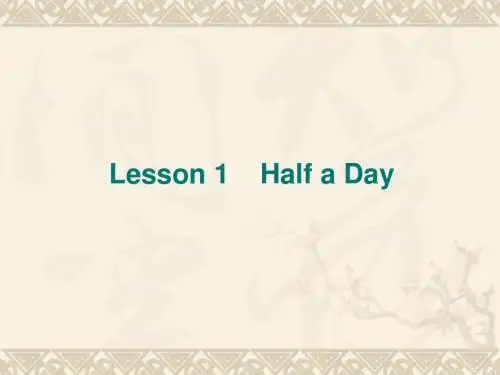
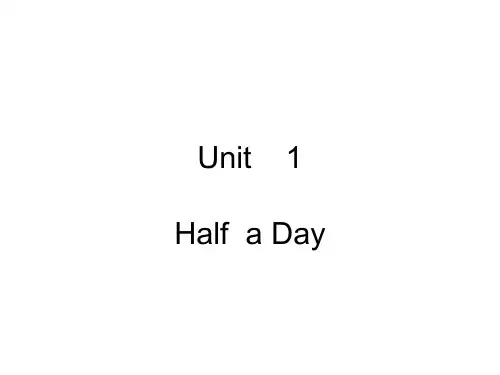
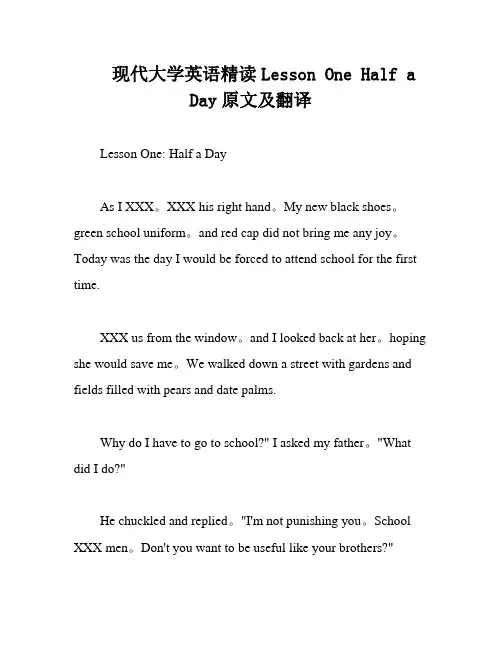
现代大学英语精读Lesson One Half aDay原文及翻译Lesson One: Half a DayAs I XXX。
XXX his right hand。
My new black shoes。
green school uniform。
and red cap did not bring me any joy。
Today was the day I would be forced to attend school for the first time.XXX us from the window。
and I looked back at her。
hoping she would save me。
We walked down a street with gardens and fields filled with pears and date palms.Why do I have to go to school?" I asked my father。
"What did I do?"He chuckled and replied。
"I'm not punishing you。
School XXX men。
Don't you want to be useful like your brothers?"XXX from my home and thrown into a large。
high-walled building would do me any good.When we reached the gate。
the courtyard XXX me to go in alone and join them。
XXX to his hand。
he urged me to be brave and start this new chapter of my life。
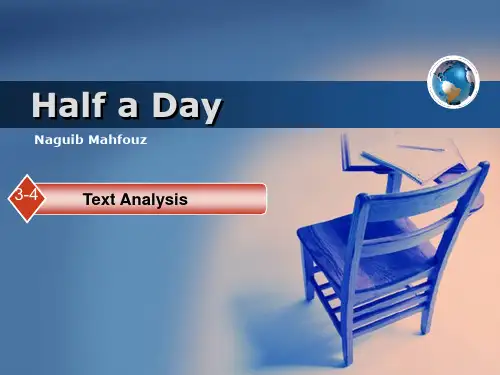
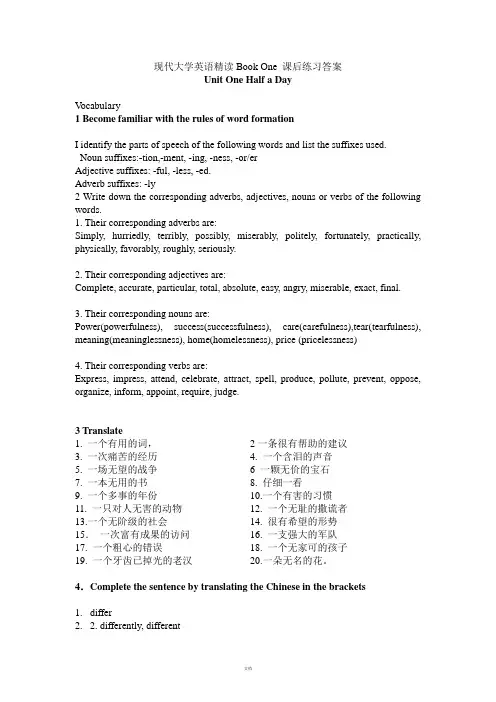
现代大学英语精读Book One 课后练习答案Unit One Half a DayV ocabulary1 Become familiar with the rules of word formationI identify the parts of speech of the following words and list the suffixes used.Noun suffixes:-tion,-ment, -ing, -ness, -or/erAdjective suffixes: -ful, -less, -ed.Adverb suffixes: -ly2 Write down the corresponding adverbs, adjectives, nouns or verbs of the following words.1. Their corresponding adverbs are:Simply, hurriedly, terribly, possibly, miserably, politely, fortunately, practically, physically, favorably, roughly, seriously.2. Their corresponding adjectives are:Complete, accurate, particular, total, absolute, easy, angry, miserable, exact, final.3. Their corresponding nouns are:Power(powerfulness), success(successfulness), care(carefulness),tear(tearfulness), meaning(meaninglessness), home(homelessness), price (pricelessness)4. Their corresponding verbs are:Express, impress, attend, celebrate, attract, spell, produce, pollute, prevent, oppose, organize, inform, appoint, require, judge.3 Translate1. 一个有用的词,2一条很有帮助的建议3. 一次痛苦的经历4. 一个含泪的声音5. 一场无望的战争 6 一颗无价的宝石7. 一本无用的书8. 仔细一看9. 一个多事的年份10.一个有害的习惯11. 一只对人无害的动物12. 一个无耻的撒谎者13.一个无阶级的社会14. 很有希望的形势15.一次富有成果的访问16. 一支强大的军队17. 一个粗心的错误18. 一个无家可的孩子19. 一个牙齿已掉光的老汉20.一朵无名的花。
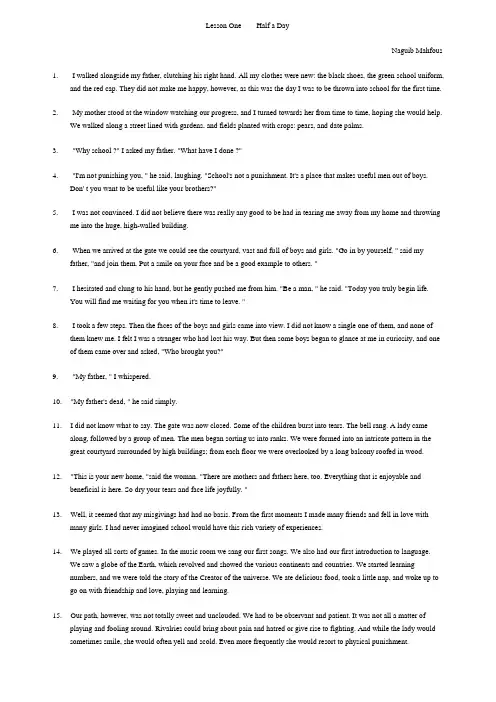
Lesson One Half a DayNaguib Mahfous1. I walked alongside my father, clutching his right hand. All my clothes were new: the black shoes, the green school uniform,and the red cap. They did not make me happy, however, as this was the day I was to be thrown into school for the first time.2. My mother stood at the window watching our progress, and I turned towards her from time to time, hoping she would help.We walked along a street lined with gardens, and fields planted with crops: pears, and date palms.3. "Why school ?" I asked my father. "What have I done ?"4. "I'm not punishing you, " he said, laughing. "School's not a punishment. It's a place that makes useful men out of boys.Don' t you want to be useful like your brothers?"5. I was not convinced. I did not believe there was really any good to be had in tearing me away from my home and throwingme into the huge, high-walled building.6. When we arrived at the gate we could see the courtyard, vast and full of boys and girls. "Go in by yourself, " said myfather, "and join them. Put a smile on your face and be a good example to others. "7. I hesitated and clung to his hand, but he gently pushed me from him. "Be a man, " he said. "Today you truly begin life.You will find me waiting for you when it's time to leave. "8. I took a few steps. Then the faces of the boys and girls came into view. I did not know a single one of them, and none ofthem knew me. I felt I was a stranger who had lost his way. But then some boys began to glance at me in curiosity, and one of them came over and asked, "Who brought you?"9. "My father, " I whispered.10. "My father's dead, " he said simply.11. I did not know what to say. The gate was now closed. Some of the children burst into tears. The bell rang. A lady camealong, followed by a group of men. The men began sorting us into ranks. We were formed into an intricate pattern in the great courtyard surrounded by high buildings; from each floor we were overlooked by a long balcony roofed in wood.12. "This is your new home, "said the woman. "There are mothers and fathers here, too. Everything that is enjoyable andbeneficial is here. So dry your tears and face life joyfully. "13. Well, it seemed that my misgivings had had no basis. From the first moments I made many friends and fell in love withmany girls. I had never imagined school would have this rich variety of experiences.14. We played all sorts of games. In the music room we sang our first songs. We also had our first introduction to language.We saw a globe of the Earth, which revolved and showed the various continents and countries. We started learningnumbers, and we were told the story of the Creator of the universe. We ate delicious food, took a little nap, and woke up to go on with friendship and love, playing and learning.15. Our path, however, was not totally sweet and unclouded. We had to be observant and patient. It was not all a matter ofplaying and fooling around. Rivalries could bring about pain and hatred or give rise to fighting. And while the lady would sometimes smile, she would often yell and scold. Even more frequently she would resort to physical punishment.16. In addition, the time for changing one' s mind was over and gone and there was no question of ever returning to theparadise of home. Nothing lay ahead of us but exertion, struggle, and perseverance. Those who were able took advantage of the opportunities for success and happiness that presented themselves.17. The bell rang, announcing the passing of the day and the end of work. The children rushed toward the gate, which wasopened again. I said goodbye to friends and sweethearts and passed through the gate. I looked around but found no trace of my father, who had promised to be there. I stepped aside to wait. When I had waited for a long time in vain, I decided to return home on my own. I walked a few steps, then came to a startled halt. Good Lord! Where was the street lined with gardens? Where had it disappeared to? When did all these cars invade it? And when did all these people come to rest on its surface? How did these hills of rubbish find their way to cover its sides? And where were the fields that bordered it? High buildings had taken over, the street was full of children, and disturbing noises shook the air. Here and there stood conjurers showing off their tricks or making snakes appear from baskets. Then there was a band announcing the opening of a circus, with clowns and weight lifters walking in front.18. Good God! I was in a daze. My head spun. I almost went crazy. How could all this have happened in half a day, betweenearly morning and sunset? I would find the answer at home with my father. But where was my home? I hurried towards the crossroads, because I remembered that I had to cross the street to reach our house, but the stream of cars would not let up.Extremely irritated, I wondered when I would be able to cross.19. I stood there a long time, until the young boy employed at the ironing shop on the corner came up to me.20. He stretched out his arm and said, "Grandpa, let me take you across."第一课半日1我走在父亲的一侧,牢牢地抓着他的右手。
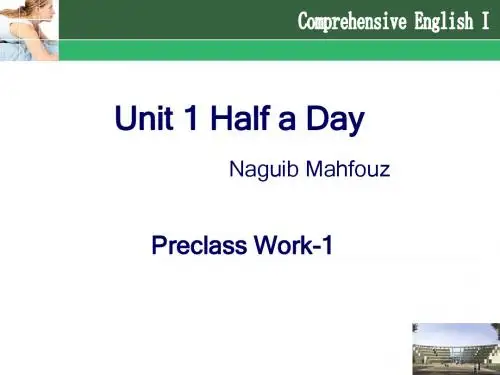
Lesson One Half a DayNaguib Mahfous 1.I walked alongside my father, clutching his right hand. All my clothes were new:the black shoes, the green school uniform, and the red cap. They did not makeme happy, however, as this was the day I was to be thrown into school for thefirst time.I proceeded alongside my father, clutching his right hand. All my clothes werenew: the black shoes, the green school uniform, and the red tarbush. They did not make me happy, as this was the day I was to be thrown into school for the first time.2. My mother stood at the window watching our progress, and I turned towardsher from time to time, hoping she would help. We walked along a street linedwith gardens, and fields planted with crops: pears, and date palms.3. "Why school?" I asked my father. "What have I done?"4. "I'm not punishing you, " he said, laughing. "School's not a punishment. It's aplace that makes useful men out of boys. Don' t you want to be useful like your brothers?"5. I was not convinced. I did not believe there was really any good to be had intearing me away from my home and throwing me into the huge, high-walledbuilding.6. When we arrived at the gate we could see the courtyard, vast and full of boysand girls. “Go in by yourself,” said my father, "and join them. Put a smile on your face and be a good example to others. "7. I hesitated and clung to his hand, but he gently pushed me from him. "Be a man," he said. "Today you truly begin life. You will find me waiting for you when it's time to leave. "8. I took a few steps. Then the faces of the boys and girls came into view. I didnot know a single one of them, and none of them knew me. I felt I was a stranger who had lost his way. But then some boys began to glance at me in curiosity, and one of them came over and asked, "Who brought you?"9. "My father,” I whispered.10. "My father's dead,” he said simply.11. I did not know what to say. The gate was now closed. Some of the childrenburst into tears. The bell rang. A lady came along, followed by a group of men.The men began sorting us into ranks. We were formed into an intricate pattern in the great courtyard surrounded by high buildings; from each floor we wereoverlooked by a long balcony roofed in wood.12. “This is your new home, "said the woman.”There are mothers and fathers here,too. Everything that is enjoyable and beneficial is here. So dry your tears and face life joyfully. "13. Well, it seemed that my misgivings had had no basis. From the first moments Imade many friends and fell in love with many girls. I had never imagined school would have this rich variety of experiences.14. We played all sorts of games. In the music room we sang our first songs. Wealso had our first introduction to language. We saw a globe of the Earth, which revolved and showed the various continents and countries. We started learning numbers, and we were told the story of the Creator of the universe. We atedelicious food, took a little nap, and woke up to go on with friendship and love, playing and learning.15. Our path, however, was not totally sweet and unclouded. We had to beobservant and patient. It was not all a matter of playing and fooling around.Rivalries could bring about pain and hatred or give rise to fighting. And while the lady would sometimes smile, she would often yell and scold. Even morefrequently she would resort to physical punishment.16. In addition, the time for changing one' s mind was over and gone and there wasno question of ever returning to the paradise of home. Nothing lay ahead of us but exertion, struggle, and perseverance. Those who were able took advantage of the opportunities for success and happiness that presented themselves.17. The bell rang, announcing the passing of the day and the end of work. Thechildren rushed toward the gate, which was opened again. I said goodbye tofriends and sweethearts and passed through the gate. I looked around but found no trace of my father, who had promised to be there. I stepped aside to wait.When I had waited for a long time in vain, I decided to return home on my own. I walked a few steps, then came to a startled halt. Good Lord! Where was the street lined with gardens? Where had it disappeared to? When did all these cars invade it? And when did all these people come to rest on its surface? How did these hills of rubbish find their way to cover its sides? And where were the fields thatbordered it? High buildings had taken over, the street was full of children, and disturbing noises shook the air. Here and there stood conjurers showing off their tricks or making snakes appear and disappear from baskets. Then there was aband announcing the opening of a circus, with clowns and weight lifters walking in front.18. Good God! I was in a daze. My head spun. I almost went crazy. How could allthis have happened in half a day, between early morning and sunset? I would find the answer at home with my father. But where was my home? I hurried towards the crossroads, because I remembered that I had to cross the street to reach our house, but the stream of cars would not let up. Extremely irritated, I wondered when I would be able to cross.19. I stood there a long time, until the young boy employed at the ironing shop onthe corner came up to me.20. He stretched out his arm and said, “Grandpa, let me take you across.”第一课半日1我走在父亲的一侧,牢牢地抓着他的右手。
大学英语专业精读教材第一单元课文内容及翻译《Half a Day》一、①I walked alongside my father ,clutching his right hand.(走在父亲的身旁,我紧紧地抓住他的右手)②All my clothes were new : the black shoes , the green school uniform ,and the red cap.(那时,我穿着黑鞋子,绿校服,戴着红帽子,它们都是新的。
)③They did not make me happy, however, as this was the day I was to be thrown into school for first time.(然而,因为今天是我第一次被送去上学,所以这些衣服并没有给我带来一丝快乐。
)二、①My mother stood at the window watching our progress, and I turned towards her from time to time, hoping she would help.(母亲站在窗前望着我们缓缓前行,我也不时地回头看她,希望会从她那里得到帮助。
)②We walked along a street lined with gardens, and fields planted with crops, pears, and date palms.(我们沿着街道走着,街道两旁是花园和田野,田野里栽满了梨树和椰枣树。
)三、①“Why school ?”I asked my father .“What have I done ?”(“我为什么要去上学?”我问父亲,“是我做错了什么吗?”)四、①“I’m not punishing you,”he said ,laughing.“School’s not a punishment. It’s a place that makes useful men out of boys. Don’t you want to be useful like your brothers?”(“我不是在惩罚你,”父亲笑着说道,“上学不是一种惩罚。
Half a Day半日Naguib Mahfouz纳吉布·马哈福兹I walked alongside my father, clutching his righthand. All my clothes were new: the black shoes, thegreen school uniform, and the red cap. They did not make me happy, however, as this was the day I wasto be thrown into school for the first time.我走在父亲的一侧,牢牢地抓着他的右手。
我穿着一新:黑鞋子、绿校服、红帽子。
然而我一点儿都高兴不起来,因为今天是我第一次被送去上学。
My mother stood at the window watching our progress, and I turned towardsher from time totime, hoping she would help. We walked along a street lined with gardens and fields plantedwith crops, pears, and date palms.母亲站在窗前,望着我们缓缓前行,我不时地回头看她,希望她会救我。
我们沿着街道走着,街道两旁是花园和田野,田野里种了庄稼、梨树和椰枣树。
"Why school?" I asked my father. "What have I done?"“我为什么要去上学?”我问父亲,“是我做错了什么吗? ”"I'm not punishing you," he said, laughing. "School's not a punishment. It's a place that makesuseful men out of boys. Don't you want to be useful like your brothers?"“我不是在惩罚你,”父亲笑着说道,“上学不是一种惩罚。
Half a day
1.phrases
Walk alongside sb
Be thrown into
Do not you want to be useful like your brothers
There is really any good in doing sth
Tear sb away from
Arrive at /in
Find sb doing sth
Take /walk a few steps
Come into view
Glance at
Lose one’s way
Burst into tears=burst out tearing
Sort sb into ranks
Overlook sb/sth
Benefit form…
Dry/wipe one’s tears
No basis=grandless
Fall in love with sb
All sort of =a variety of
Take a nap
It is not a matter of doing sth
Fool around means waste time doing nothing
Give rise to
Resort to
Change one’s mind
There is on question doing sth \
Take advantage of
Trace of sb
In vain
In a daze
Take over =replace
Let up
Stretch out
2.Translation
⑴They took advantage of our helpless situation and took over our company.
⑵Although there are still difficulties ahead of us, I am sure that we Chinese people will have the wisdom to bring about the peaceful unification of our country on our own.
⑶It is wrong to put emphasis on nothing but GDP. It will give rise to many serious problems.
⑷He loves to show off his wealth, but that is all in vain. People also avoid him as though he were poison.
⑸He soon fell in love with this village, and was determined to make it a beautiful garden together with other villagers.
⑹We must spend more money fighting against global worming. In addition, we must resort to tough laws. It is not just a matter of money .
⑺When the police arrived at school ,the students and teachers were still in a daze.
⑻This corrupt official was still clinging to his power. He refused to step aside.
⑼When the man finally came in to view, I found it was my father. I did not know how he managed to find this place in the blinding snow. At that moment , I burst into tears.
⑽She glanced at him from time to time. It was the first time in her life that she had found herself looking at a young man like that.
⑴Before I came into collage, I had never thought that that life in collage would be so rich and interesting.
⑵Most of the Chinese collage students born in 1990s are the only child of their families.
⑶All those who know him admire him for his work .
⑷I missed this class because I did not know it had moved up to Thursday.
⑸In some counties, those who are overweight will be punished one way or another.
⑹Soon after the fire,those who were lost their homes were taken to a safe place .
⑺When we met again, we found that we both had changed a lot.
⑻A team of experts headed by Professor Li will soon come and help famers solve their problems.
⑼The field planted with tomatoes used to be wasteland.
⑽Our teacher told us to read books written by such master as Mar Dun and Ba Jin.。